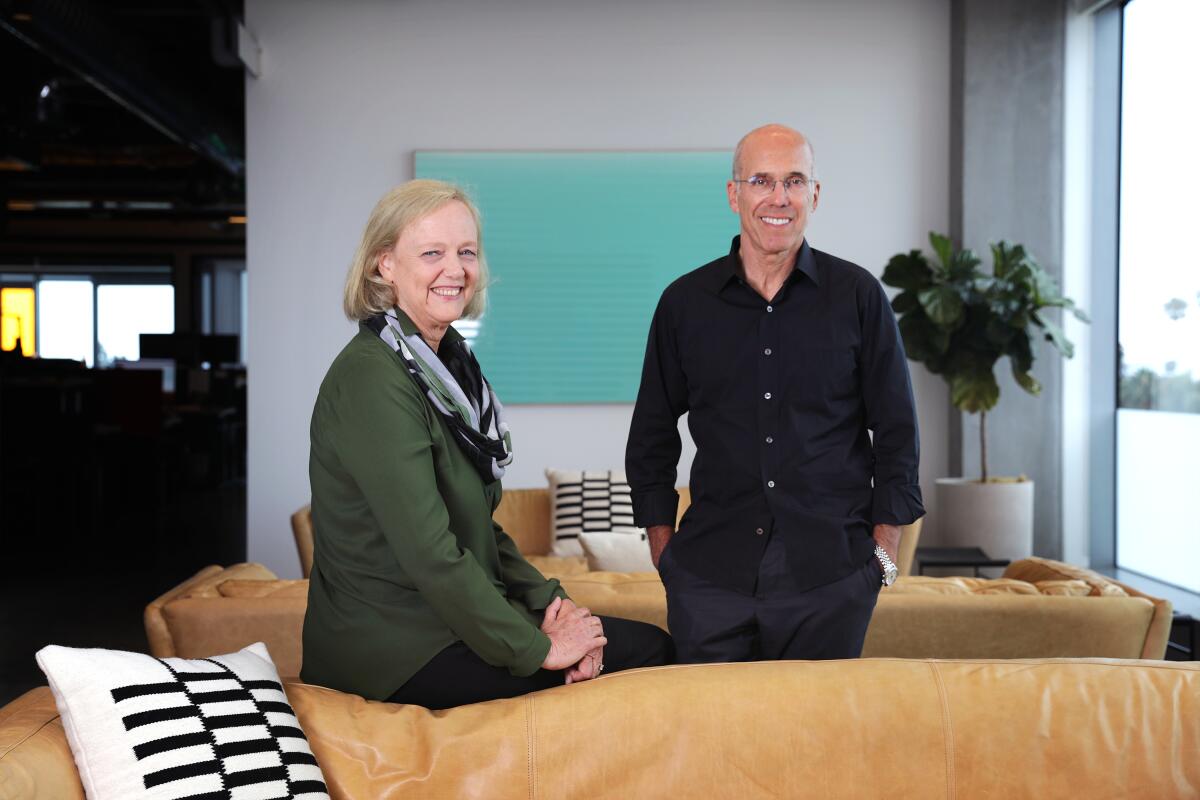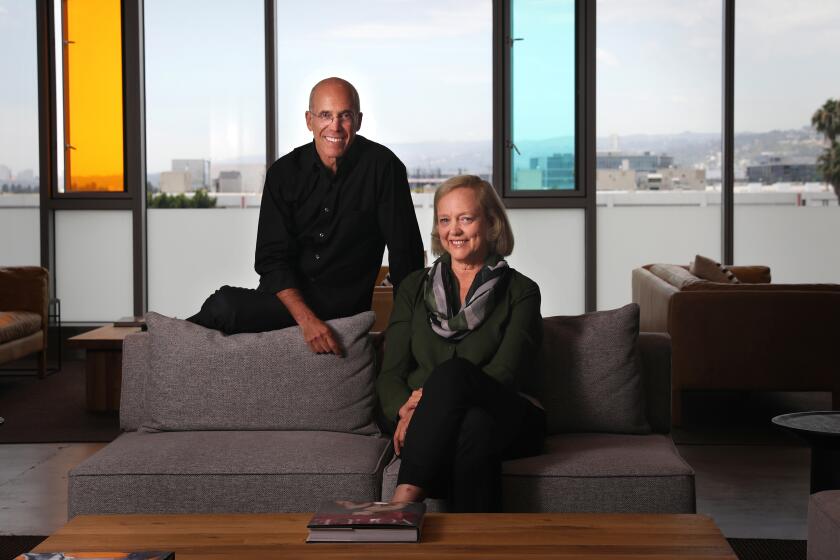Quibi cites pandemic, protests for drop in rankings. Others cite lack of hits

It was Hollywood’s most anticipated startup. Quibi vowed to transform the streaming business by delivering bite-size entertainment to younger audiences who’ve turned from legacy studios.
But two months after its debut, Quibi’s programs have yet to take off among the millennials who are key to its success, according to interviews with analysts and newly compiled data from research firms.
When it launched on April 6, Quibi was the fourth ranked app based on number of downloads for iPhones, according to San Francisco market research firm Sensor Tower. Since then, it has plummeted to 1,157 as of last week, behind programs like word game “Wordzee!” but just before “At Home Women’s Workouts.” That ranking is substantially lower than other services, including new streamers such as Disney+ (which ranked at 57) and HBO Max (which placed 46th).
The streaming service has recently improved in the iPhone app rankings, placing at 284 on Tuesday, but it is still far below Disney+ , which moved up to 50 and HBO Max, which dropped to 67, according to Sensor Tower.
“It is uncommon in our experience for an app with Quibi’s profile to lose as much ground on the store’s ranking over such a relatively short period, but then again, Quibi’s nature and circumstance is outside the usual,” said Randy Nelson, head of mobile insights for Sensor Tower.
Also slowing is the pace at which people are installing the app, according to Sensor Tower. Last week, the app reached its lowest level of first-time installs with 62,000, down from 170,000 a week earlier, the market research firm said. Quibi had nearly 3.9 million unique downloads since its launch, according to estimates by Sensor Tower.
Quibi disputes Sensor Tower’s data, saying it differs from the information Quibi receives directly from Apple and Google and that its app has been downloaded at least 4.6 million times, including those who signed up for a free trial (some analysts have given a lower amount).
But the company has not met viewership targets it set for advertisers. In earlier projections the company predicted it would have 7 million subscribers in its first year, generating $250 million in subscriber revenue, according to one person briefed on the streamer’s plans.
In an interview, Quibi Chief Executive Meg Whitman acknowledged that one reason the app dropped so far in rankings was because it did not release any new programs and stopped marketing last week.
“These are truly pivotal and unprecedented times,” Whitman said, referring to the pandemic and how the country is engaged in an important dialogue and social movement focused on Black Lives Matter. “We needed to take the time to step back, be a part of this discussion.”
She also noted that Quibi is just eight weeks old. “Category creation takes time and we knew it would take time,” Whitman said.
Quibi targets people ages 18 to 44 with a mix of news, entertainment and reality programs. Episodes are 10 minutes or less. The app charges a monthly fee of $4.99 with ads and $7.99 without ads.
The service has big Hollywood names in its lineup, including actor Liam Hemsworth, who stars in the thriller “Most Dangerous Game,” and “Game of Thrones” actress Sophie Turner, who is featured in the drama “Survive.” Other high profile shows in the works include a series from director Steven Spielberg.
But, so far at least, Quibi’s shows haven’t attracted the kind of buzz of popular series like Disney+’s “The Mandalorian” or Apple TV+’s “The Morning Show,” according to newly released data from West Hollywood-based Parrot Analytics.
The company tracks consumer demand for shows based on such factors as illegal downloads, social media use and online searches. By that measure, the top Quibi program on its first week, reality series “Chrissy’s Court” starring Chrissy Teigen, generated just 2.5 times the demand of an average show in the U.S. By comparison, on its launch week, “The Mandalorian” generated nearly 58 times the demand of an average show in the U.S.
“There’s an issue with their content,” Alejandro Rojas, director of applied analytics at Parrot Analytics, said about Quibi. “We know their content has to be able to attract the amount of attention that they require to keep thriving and growing, and that’s easier said than done.”
Jeffrey Katzenberg and Meg Whitman run Quibi, a digital platform creating bite-size shows for millennials to watch on their smartphones.
Quibi’s chairman, Jeffrey Katzenberg, has publicly blamed the coronavirus for much of the company’s rough start. To be sure, the pandemic has halted some planned shoots.
Sheltering at home also hurt Quibi’s strategy of appealing to consumers looking to watch a quick video as they waited for friends at restaurants, worked out at the gym or commuted to work.
“They’re in a tough spot,” said the industry executive briefed on the company’s plans. “I think what they need to do is hang on because eventually people will be leaving their houses again.”
Quibi does not plan any major strategy changes and is preparing for a robust schedule of programs this year. Whitman said it is looking to add more comedies due to increased demand. Already, the company has renewed the cooking competition “Dishmantled,” wherein blindfolded contestants get food thrown at their faces, then recreate the dish they thought they tasted.
Quibi will also continue to look for more diverse voices, including Black, Latino and LGBTQ creators. Already, there are 19 programs on Quibi by Black creators in front of or behind the camera, Whitman said.
The name of the content category called Daily Essentials, which encompasses daily programming like news, also will be changed. Instead, those programs will be marketed and promoted on the app as individual shows instead of a category.
“What we learned from users is they didn’t understand what Daily Essentials were,” Whitman said.
Whitman said that there are shows that she considers successful and trending on the platform, such as “Chrissy’s Court.”
“Remember, we’re a small platform,” Whitman said. “The number of viewers on our platform for a hit show might be different than on another streaming platform, but we do have some hit shows in the context of Quibi.”
Quibi is set to launch Monday -- amid the coronavirus lockdown.
Analysts say that Quibi’s problems aren’t simply due to the health crisis and its app dropped in the rankings even before George Floyd’s death sparked protests. Other streaming video platforms like Netflix have thrived as more people are staying at home. They say much of the blame rests on Quibi’s programming and distribution strategy.
“Quibi would have had a struggle without the coronavirus,” said Ross Benes, an analyst with research firm eMarketer. “To blame the coronavirus entirely is nonsensical.”
Benes, a 31-year-old-millennial, said he doesn’t think the content on Quibi is that unique and viewers can find similar content on YouTube and Snap. Active users with lots of free time at home can go through Quibi’s content library pretty quickly, he added.
“They need quality shows that people will pay for,” Benes said.
There are some promising signs. Last month, Quibi released the newest season of the comedy “Reno 911!” The series, which previously aired on Comedy Central, is Quibi’s first hit, according to Parrot Analytics.
But the firm says Quibi needs to act quickly to retain those viewers. Parrot Analytics’ research finds that viewers of “Reno 911!” also like watching animated show “Rick and Morty,” the thriller “Defending Jacob” and the drama “Billions.” Quibi doesn’t have these types of supporting shows on its platform, which could push consumers to look for the content they like on other streaming services, Rojas said.
TikTok, a popular based social video app owned by China-based ByteDance, has seen explosive growth this year amid the coronavirus crisis. The company has plans to hire more people, including at its Culver City office.
Quibi lost other opportunities. It was designed to be viewed on a mobile phone. At launch, the company didn’t offer an option to cast the shows on TVs and only later made this feature available, said Paul MacDougall, a principal sales engineer at Bitmovin, an online video software company based in San Francisco and Klagenfurt, Austria.
“Making a mobile-exclusive service when everybody pretty much around the world is not mobile puts you in a very bad spot,” MacDougall said. “You’re certainly not aligned at all with the current market conditions.”
Nonetheless, Quibi believes it’s in a good financial position, raising $1.75 billion. The Hollywood company has tightened its belt, with its senior leadership team volunteering to take a 10% pay cut.
But there are challenges ahead. The company has not met viewership metrics in its earlier agreements with advertisers, which could cause those deal terms to be altered, according to industry sources who declined to be named.
“All of our advertising partners have their own challenges with the global pandemic, but we’re fortunate to have great partners, and we’re going to work closely with them on plans to address their individual needs in the short and long term,” Whitman said.
From Walmart to Google, brands have had to adapt their advertising messages to convey more empathy with consumers during the coronavirus crisis.
Already, Quibi has cut how much it spends promoting its service. From March 22 to April 18, Quibi had spent just under $4 million on ads, and that has since dropped 84% to about $650,000 during the time frame of April 19 to May 16, according to MediaRadar, a New York firm that tracks ad spending.
“That suggests that they are retooling and thinking about how do they position the product,” said MediaRadar Chief Executive Todd Krizelman. “We interpret that decline as them thinking about how to reframe the content.”
Some Hollywood insiders think Quibi should scrap its original game plan, but Whitman says the formula remains the same and has reassured her staff about the company’s future.
“As we shared in our most recent company meeting, the best is yet to come,” Whitman and Katzenberg wrote in a recent memo to staffers. “We are confident in Quibi and the work that you are creating every day.”
More to Read
Inside the business of entertainment
The Wide Shot brings you news, analysis and insights on everything from streaming wars to production — and what it all means for the future.
You may occasionally receive promotional content from the Los Angeles Times.













